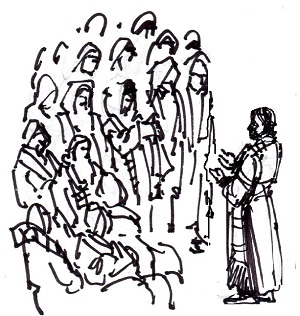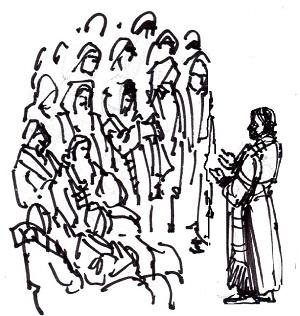

“By what authority are you doing these things?” (Matt 21:23).
Num 24:2-7, 15-17a; Matt 21:23-27
The Lectionary’s pairing of the story of Balaam with the confrontation between Jesus and the chief priests appears to be because both stories are about authority.
Balaam, a non-Israelite prophet, is ordered by his king to pronounce an oracle against Israel, but he refuses after a dream in which God tells him otherwise. He is obeying a higher authority. He praises Israel and affirms that God has given it a special blessing.
In today’s Gospel, the chief priests and elders demand to know by what authority Jesus is preaching and working miracles. Instead of listening to his message and acknowledging his good works, his critics focus instead on his credentials. No matter how impressive or authentic Jesus is, they only want to know where he is from or who is backing him. He is, in their eyes, a hill country preacher from Galilee without formal training or official approval, so nothing he says or does matters.
Jesus turns the question back on them, asking them if John the Baptist’s authority came from God or was of earthly origin. They refuse to answer, caught between John’s popular following and their rejection of John. The story is clever and perhaps contrived, suggesting that arguments between Jews and Christians about Jesus’ credentials persisted in the early church when Matthew was composing his Gospel. But would Jesus have refused to say that his authority was clearly from God?
As an Advent theme, these readings follow Sunday’s Gospel in which even John the Baptist questioned Jesus’ authority. At issue for us now is whether we believe in Jesus. Is he the Incarnate Word of God? Is he God in human flesh come into the world as one of us? Is Christmas a mystery of profound, even ultimate, importance to our salvation and destiny, or is it a religiously-based cultural celebration with a message about generosity and family unity? These are wonderful things, but are they Christmas?
Unfortunately, no one can answer the question for us. As in today’s Gospel. Jesus waits for us to answer it for ourselves, because discipleship cannot begin without our assent. Like a child’s belief in Santa Claus, a secret we encourage until it is time to welcome them into the “real” world, belief in Jesus hangs in some higher realm of the mind waiting for evidence and experience to bolster or challenge its credibility.
A yes or no represents two different paths, two different sets of experiences that will in fact confirm either choice. Skepticism is a waiting room. Faith is a journey of discovery.
Like every major Solemnity posed within the liturgical year, Christmas is a call to recommit ourselves to accompanying Jesus more deeply into the mystery of our shared humanity and life with God. To believe is a way of life, an invitation to move from doubt to faith, then greater faith, then seasoned faith and, finally, total, intimate faith.
Generations of believers have paused, then begun again on the strength of these words: “In your hearts revere Christ as Lord. Always be prepared to give an answer to everyone who asks you to give the reason for the hope that you have” (1 Peter 3:15).
Advertisement







